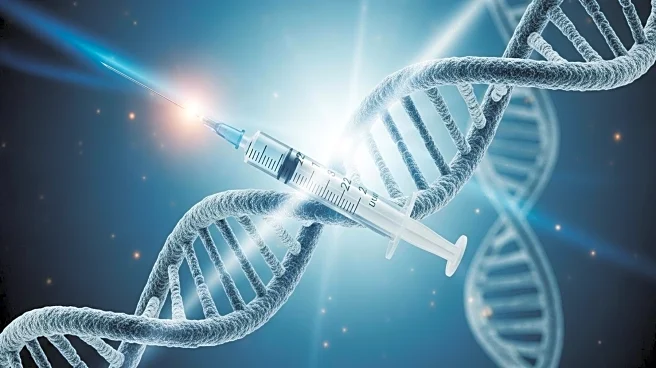What's Happening?
Genethon and Hansa Biopharma have announced promising results from a clinical trial involving the use of imlifidase as a pretreatment for gene therapy in patients with Crigler-Najjar syndrome who are immune to adeno-associated virus (AAV) vectors. The trial, presented at the European Society of Gene & Cell Therapy (ESGCT) congress, involved a patient with severe Crigler-Najjar syndrome who was naturally immune to the AAV8 vector. Imlifidase, an enzyme developed by Hansa Biopharma, was used to cleave immunoglobulin G (IgG) antibodies, thereby reducing anti-AAV antibodies and allowing the administration of Genethon's GNT0003 gene therapy. The treatment successfully lowered the patient's bilirubin levels, enabling her to cease prolonged daily phototherapy. This marks the first successful administration of gene therapy to a patient with Crigler-Najjar syndrome who has antibodies against AAV8.
Why It's Important?
This development is significant as it opens new avenues for treating patients with Crigler-Najjar syndrome who are immune to AAV vectors, a common barrier in gene therapy. The ability to use imlifidase to reduce anti-AAV antibodies could potentially expand the eligibility for gene therapy to a broader patient population, addressing a critical unmet need. This approach could also be applicable to other conditions where AAV immunity is a challenge, thereby enhancing the scope and effectiveness of gene therapy treatments. The success of this trial could lead to more inclusive clinical trials and treatments, improving outcomes for patients with rare genetic diseases.
What's Next?
Further stages of the trial will be conducted to confirm the efficacy and safety of this approach in a larger cohort. If successful, this method could become a standard pretreatment for patients with AAV immunity, potentially transforming the landscape of gene therapy. Researchers will continue to explore the immune response to AAV vectors to refine and optimize treatment protocols. The results of these trials could influence regulatory approvals and pave the way for broader clinical applications of gene therapy in rare genetic diseases.
Beyond the Headlines
The trial highlights the importance of overcoming immune barriers in gene therapy, which could lead to ethical discussions about access to advanced treatments for rare diseases. The collaboration between Genethon and Hansa Biopharma exemplifies the potential of international partnerships in advancing medical research. Long-term, this approach could shift the paradigm in treating genetic disorders, emphasizing the need for innovative solutions to complex medical challenges.










